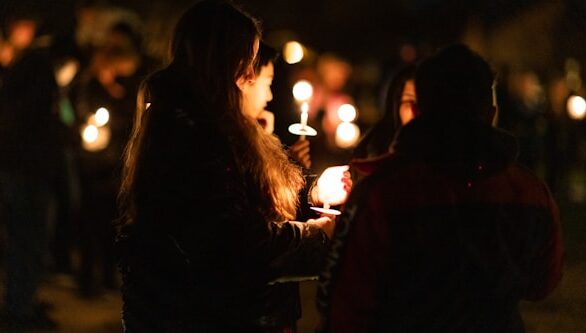Zara Aleena’s vigil becomes a powerful outcry against institutional failures and violence against women
The streets of Ilford pulsed with fury and heartbreak on Sunday as mourners gathered to honour Zara Aleena, the 35-year-old law graduate brutally murdered three years ago. Her memory now fuels a national reckoning, with campaigners and relatives demanding urgent reforms to protect women from violence.
Zara was stalked and attacked by Jordan McSweeney, a convicted offender released just nine days earlier. He should never have been on the streets, and his release was just the first of several catastrophic failures by state agencies. The outrage was palpable as Farah Naz, Zara’s aunt, stood before the crowd and declared, “We walk Zara home and we say: no more.”
She called her niece’s killing “preventable,” and in doing so gave voice to the heartbreak of a nation that continues to lose women to violence enabled by broken systems. Zara was just minutes from her home when she was targeted. Her loss has become a symbol of Britain’s failure to protect women and girls, despite years of public outcry and political promises.
The emotional vigil was attended by senior politicians, including Health Secretary Wes Streeting and Justice Minister Alex Davies-Jones, who echoed calls for the government to halve violence against women and girls within a decade. But campaigners say words mean little without structural change. “Policies won’t protect us,” said one activist holding a placard that read, “Still Not Safe.”
That frustration is backed by damning evidence. A packed inquest into Zara’s murder revealed glaring errors by probation and police services. A jury concluded that “multiple state agencies” failed to assess McSweeney as the threat he clearly was. Procedures weren’t followed. Warnings weren’t heeded. And Zara paid the price.
Her family, joined by relatives of other murdered women — including Sabina Nessa and Jan Mustafa — have transformed grief into a powerful campaign for reform. They are lobbying for new laws that force violent offenders to appear at sentencing. It’s a small step, they argue, in restoring dignity to victims and accountability in the justice system.
Despite improvements since Zara’s death — such as better 999 response training and greater oversight — campaigners say they still face a wall of misogyny, indifference, and institutional failure. The sense of betrayal runs deep.
Jordan McSweeney was convicted at the Old Bailey and sentenced to a minimum of 38 years, later reduced to 33 — a move that felt like a cruel injustice to Zara’s family. “It rubs salt in our wounds,” said Farah. “Justice should bring peace, not more pain.”
As public trust in Britain’s justice system continues to erode, the vigil in Ilford was a loud, united cry for change, not just incremental reforms, but radical, society-wide transformation. Those who knew Zara describe her as brilliant, driven, and full of kindness — qualities that now stand in stark contrast to the failures that cost her her life.
Her legacy, they insist, must be more than a memory. It must be a catalyst. The message was clear from those who stood in silence and those who shouted through tears: “Zara’s death must not be in vain. Women must be safe.”
